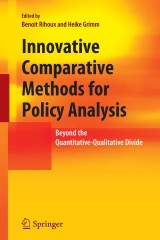Details

Innovative Comparative Methods for Policy Analysis
Beyond the Quantitative-Qualitative Divide|
149,79 € |
|
| Verlag: | Springer |
| Format: | |
| Veröffentl.: | 20.03.2006 |
| ISBN/EAN: | 9780387288291 |
| Sprache: | englisch |
| Anzahl Seiten: | 344 |
Dieses eBook enthält ein Wasserzeichen.
Beschreibungen
<P>Innovative Comparative Methods for Policy Analysis aims to provide a decisive push to the further development and application of innovative and specific comparative methods for the improvement of policy analysis. To take on this challenge, this volume brings together methodologists and specialists from a broad range of social scientific disciplines and policy fields.</P>
<P></P>
<P>The work further develops methods for systematic comparative cases analysis in a small-N research design, with a key emphasis laid on policy-oriented applications. Innovative Comparative Methods for Policy Analysis is clearly both a social scientific and policy-driven endeavor; on the one hand, the book engages in an effort to further improve social scientific methods, but on the other hand this effort also intends to provide useful, applied tools for policy analysts and the "policy community" alike. Though quite a variety of methods and techniques are touched upon in this volume, its focus is mainly laid on two recently developed research methods/techniques which enable researchers to systematically compare a limited number of cases; Qualitative Comparative Analysis(QCA) and Fuzzy-Sets (FS).</P>
<P></P>
<P>The work further develops methods for systematic comparative cases analysis in a small-N research design, with a key emphasis laid on policy-oriented applications. Innovative Comparative Methods for Policy Analysis is clearly both a social scientific and policy-driven endeavor; on the one hand, the book engages in an effort to further improve social scientific methods, but on the other hand this effort also intends to provide useful, applied tools for policy analysts and the "policy community" alike. Though quite a variety of methods and techniques are touched upon in this volume, its focus is mainly laid on two recently developed research methods/techniques which enable researchers to systematically compare a limited number of cases; Qualitative Comparative Analysis(QCA) and Fuzzy-Sets (FS).</P>
Systematic Comparative Case Studies: Design, Methods and Measures.- The Limitations of Net-Effects Thinking.- A Question of Size?.- MSDO/MDSO Revisited for Public Policy Analysis.- Beyond Methodological Tenets.- Innovative Comparative Methods to Analyze Policy-Making Processes: Applications.- Entrepreneurship Policy and Regional Economic Growth.- Determining the Conditions of HIV/AIDS Prevalence in Sub-Saharan Africa.- Diversity, Ideal Types and Fuzzy Sets in Comparative Welfare State Research.- Scenario-Building Methods as a Tool for Policy Analysis.- Innovative Comparative Methods for Policy Implementation and Evaluation: Applications.- A New Method for Policy Evaluation?.- Social Sustainability of Community Structures: A Systematic Comparative Analysis within the Oulu Region in Northern Finland.- QCA as a Tool for Realistic Evaluations.- Conclusion.- Conclusion.
<P><EM>Innovative Comparative Methods for Policy Analysis</EM> aims to provide a decisive push to the further development and application of innovative and specific comparative methods for the improvement of policy analysis. To take on this challenge, this volume brings together methodologists and specialists from a broad range of social scientific disciplines and policy fields.</P>
<P></P>
<P>The work further develops methods for systematic comparative cases analysis in a small-N research design, with a key emphasis laid on policy-oriented applications. Innovative <EM>Comparative Methods for Policy Analysis</EM> is clearly both a social scientific <EM>and</EM> policy-driven endeavor; on the one hand, the book engages in an effort to further improve social scientific methods, but on the other hand this effort also intends to provide useful, applied tools for policy analysts and the ‘policy community’ alike. Though quite a variety of methods and techniques are touched upon in this volume, its focus is mainly laid on two recently developed research methods/techniques which enable researchers to systematically compare a limited number of cases; Qualitative Comparative Analysis(QCA) and Fuzzy-Sets (FS).</P>
<P></P>
<P>The work further develops methods for systematic comparative cases analysis in a small-N research design, with a key emphasis laid on policy-oriented applications. Innovative <EM>Comparative Methods for Policy Analysis</EM> is clearly both a social scientific <EM>and</EM> policy-driven endeavor; on the one hand, the book engages in an effort to further improve social scientific methods, but on the other hand this effort also intends to provide useful, applied tools for policy analysts and the ‘policy community’ alike. Though quite a variety of methods and techniques are touched upon in this volume, its focus is mainly laid on two recently developed research methods/techniques which enable researchers to systematically compare a limited number of cases; Qualitative Comparative Analysis(QCA) and Fuzzy-Sets (FS).</P>
Innovative Comparative Methods for Policy Analysis brings together methodologists and specialists from a broad range of social scientific disciplines to provide a decisive push to the further development and application of innovative and specific comparative methods for the improvement of policy analysis. Includes supplementary material: sn.pub/extras
<P>Innovative Comparative Methods for Policy Analysis aims to provide a decisive push to the further development and application of innovative and specific comparative methods for the improvement of policy analysis. To take on this challenge, this volume brings together methodologists and specialists from a broad range of social scientific disciplines and policy fields. The work further develops methods for systematic comparative cases analysis in a small-N research design, with a key emphasis laid on policy-oriented applications. Both a social scientific and policy-driven endeavor, the book engages on one hand in an effort to further improve social scientific methods, and on the other provides useful, applied tools for policy analysts and the "policy community" alike. Much of the focus is on Qualitative Comparative Analysis(QCA) and Fuzzy-Sets (FS), two recently developed research methods which permit a systematic comparison of a limited number of cases.</P>

















